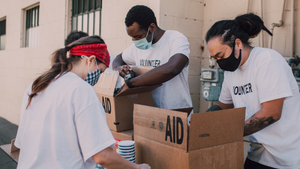Texas community to form holistic mental health crisis response teams
For decades, the responsibility of helping those experiencing a mental health crisis has fallen to police departments, and communities across the United States have grappled with the safety and effectiveness of this distribution of duties— wondering if there’s a better way to get constituents the help they need.
June 2, 2022

When it comes to fielding mental health calls, “Historically, society has relied on officers,” said Doug Balli, chief of police in Galveston, Texas, during a roundtable discussion Thursday about a multi-agency mental health crisis response initiative being launched in the city later this year. The initiative, which will create Multi-Disciplinary Response Teams, brings together civilian medical professionals and public safety officers for a unified holistic response.
Traditionally, the burden of helping those in crisis has been carried by law enforcement professionals, who aren’t necessarily equipped to do so. Limited by training and scope of responsibility, police officers generally have two avenues of response: “Handcuffs and emergency (psychiatric) detention orders. We all know that detention is generally not the answer,” Balli said, and “Arresting those in mental health crisis for petty crimes does not prove to be very successful in these situations.”
While Galveston, an island community of around 50,000 people off the coast of Texas, has benefitted from the county sheriff’s mental health response programs, it’s not a sustainable structure.
“We know they are stretched very thin throughout the county to address these issues,” Balli said.
Starting in October, the new initiative will create teams of licensed mental health professionals, paramedics and specially trained law enforcement officers to respond to those in crisis. The health care workers will aid those in crisis and law enforcement will ensure everyone is safe—a role they’re well equipped to complete.
B.J. Wagner, senior vice president of health and public safety at the Meadows Institute, which is working with city administrators to implement the program, noted “there’s long been a precedent for law enforcement to” not just help those in crisis, but to provide safety for first responders.
“Mental illness is a medical need,” Wagner said. “If we keep responding to mental health emergencies instead of (resolving) the unmet medical care needs,” the issue will persist.
To that end, the program is holistic, with each team being “nested within a set of essential services that permit access to care beyond the immediate crisis, including 24-hour care and responsive community services related to urgent psychiatric care, housing and other needs,” according to a statement about the initiative. It’s based on a proof of concept developed by the Meadows Institute through a grant from the W.W. Caruth Jr. Fund at Communities Foundation of Texas. The model was first tested in early 2018 in Dallas and is now part of a nationwide collaboration with The Pew Charitable Trusts.
The Dallas pilot showed how “many mental health emergencies can be handled at the community level instead of through arrest,” the statement says. There, teams consisting of a paramedic, a mental health clinician and a trained police officer were assigned to the district that generated the most mental health 911 calls in the city.
According to the Meadows Institute study, the teams responded to 6,679 calls from Jan. 29, 2018 through June 7, 2020. The analysis found that 40 percent of calls resulted in a connection to community services, such as a referral to health or housing services; 29 percent of calls were resolved on the scene with no further assistance needed; only 14 percent of calls resulted in emergency detention; and 8 percent of calls resulted in a person being taken to a hospital or psychiatric facility.
Earlier this year, Dallas expanded the program throughout the city, adding two new teams and increasing active units from nine three-person units to 15. The goal moving forward is to replicate those results in Galveston.
Others on the panel Thursday included Stephen Holmes, Galveston County commissioner; Charlie Olsen, Galveston’s fire chief; Felicia Jeffery, CEO of Gulf Coast Center; and Tiffany Russel, project director of mental health and justice partnerships at Pew Charitable Trust. Craig Brown, Galveston’s mayor, opened the session.
“We are delighted to be working with The Pew Charitable Trusts, the Meadows Mental Health Policy Institute, and several local foundations focused on the best interest of the residents of Galveston,” said Brown in a statement. “I am confident that this health-first policing model will exemplify how public-private partnerships can make a dramatic difference in the community of Galveston.”
As police chief overseeing the safety of both year-round residents and the many tourists that visit the resort community seasonally, Balli said he’s hopeful that “Transitioning to this holistic approach will help prevent violent encounters between police and those who are suffering from a mental health crisis.”







